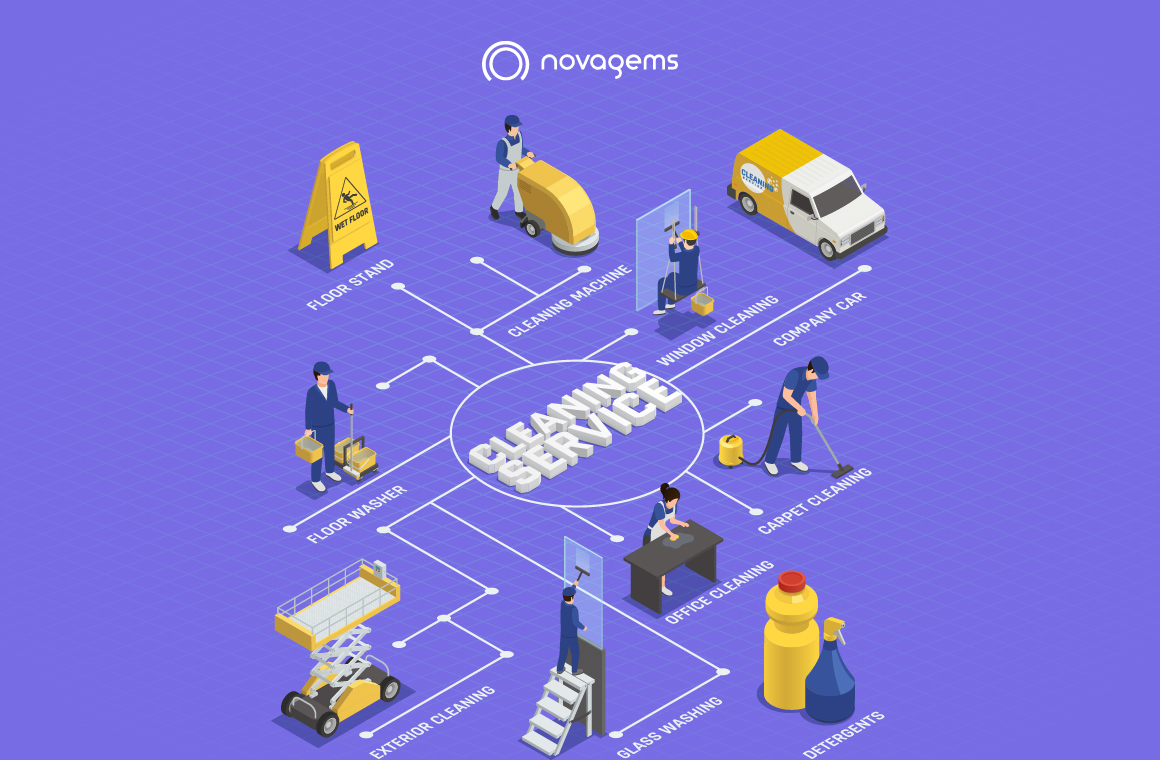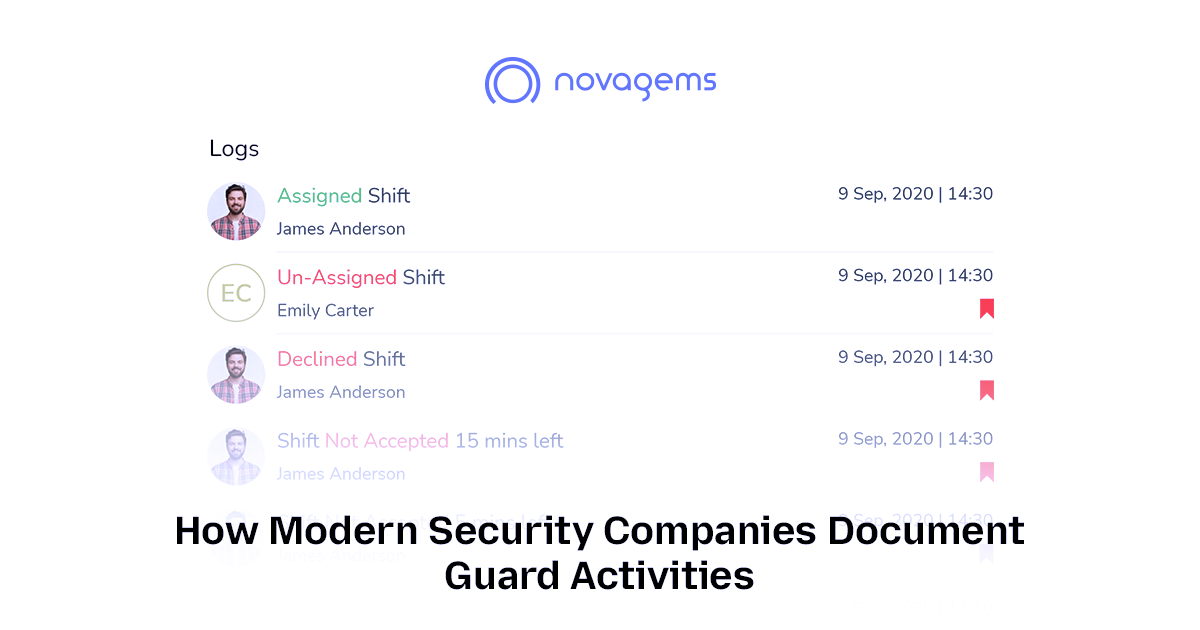How to be an effective cleaning team leader in your cleaning business
Published on: Tue, Jan 21, 2025
Read in 10 minutes

Key Takeaways
- An effective cleaning team leader inspires, organizes, and motivates staff to deliver consistent results.
- Strong leadership directly improves employee engagement, client satisfaction, and profitability.
- Measurable KPIs like turnover rates, client reviews, and job completion times show leadership success.
- Technology and workforce analytics will shape the future of cleaning business leadership, making data-driven decisions essential.
Why Leadership Matters in Cleaning Businesses
A cleaning business is only as strong as its people. And those people depend on a leader who provides guidance, structure, and motivation.
Without effective leadership, cleaning teams risk:
- Missed deadlines.
- Low morale.
- High staff turnover.
- Inconsistent service that frustrates clients.
According to Gallup, engaged teams are 21% more profitable than disengaged ones. In an industry where margins are tight and customer loyalty is vital, leadership directly impacts both growth and survival.
You can only hope to make a name for yourself in the cleaning industry if you have an efficient team. Just having relevant skills and requirements is not enough. To win more cleaning contracts you need to make sure that your cleaning team is beating all the competition out there. You need to have a proper team that will be well-functioning. Even if the team is of only two people, they need to be well coordinated. But as you start to expand your cleaning business, you will see that your team is increasing in numbers too.
Then you will need to make some changes. Like having a manager, team leader, and coordinator. Now you might think aren’t they the same? Well, no. Being an effective cleaning team leader in a cleaning business is different from being a manager. The team leader’s role is to guide and support the team while ensuring the work meets high standards. Let’s explore the key differences, and qualities of a good leader, and how you can effectively lead your cleaning team.
Difference Between a Cleaning Team Leader and Manager
While both roles are crucial for a successful cleaning business, a team leader and a manager have distinct responsibilities.
- Team Leader: A team leader works closely with the cleaning staff on the ground. They set a positive example, ensure team members are motivated, and help solve daily issues. Their main role is to be a bridge between the staff and the management.
- Manager: A manager handles more of the planning, organizing, and oversight of multiple teams or sites. They focus on the business’s broader goals, resource management, and administrative tasks. Managers may not always work side-by-side with the cleaning staff.
In summary, a team leader is more hands-on with the daily tasks, while a manager handles the overall business operations.
The Role of a Leader
An effective cleaning team leader has a role beyond assigning tasks. They set the tone, ensure standards are met, and support their team members.
- Guiding the Team: The leader’s job is to ensure that all tasks are performed to the client’s standards and that team members understand their responsibilities. They act as a guide and are available to answer questions and provide support when needed.
- Building Morale: Keeping team morale high is key. A leader should motivate team members, provide encouragement, and help them feel valued. Happy employees are more productive and provide better service.
- Problem-Solving: When issues arise, the team leader steps in to address them promptly. Whether it’s resolving conflicts among staff, managing delays, or handling supply shortages. A leader’s role is to keep everything running smoothly. When things get out of hand for a team leader, the cleaning service manager will come into the picture.
Qualities of an Effective Leader
To be a successful cleaning team leader, certain qualities are necessary to effectively manage a team and meet business objectives.
- Communication Skills: An effective leader communicates clearly with both staff and clients. They provide instructions, listen to team concerns, and ensure everyone is on the same page. Clear communication is the foundation of leadership in a cleaning business. A team leader must be able to explain daily tasks, demonstrate proper cleaning techniques, and ensure everyone understands safety protocols. But communication goes beyond instructions, it also means listening to staff concerns, clarifying doubts, and keeping everyone aligned with client expectations. When leaders foster open dialogue, they reduce misunderstandings and create a culture of trust.
- Empathy and Respect: A good leader understands their team members’ needs and treats them with respect. This fosters a positive work environment and strengthens team bonds.
- Problem-Solving Abilities: The ability to quickly identify issues and find solutions is crucial. Leaders should be proactive and tackle any problems before they impact the team or client satisfaction. Disagreements happen, between employees, or between staff and clients. A skilled leader knows how to de-escalate tension quickly and find a solution that satisfies all parties. Whether it’s resolving disputes about workload, handling client complaints, or managing personality clashes, conflict resolution requires fairness, patience, and diplomacy
- Organization and Time Management: Managing time effectively, setting priorities, and ensuring tasks are completed on time are vital qualities for a cleaning team leader. Time is money in the cleaning industry. Leaders often juggle multiple sites, client demands, and staff availability. Effective time management ensures that cleaning jobs are completed on schedule without compromising quality. A leader who can prioritize tasks, assign work fairly, and anticipate delays prevents chaos and keeps operations smooth.
- Reliability and Integrity: Leaders should be trustworthy and dependable. They lead by example, showing commitment to both their team and clients.
So while applying for cleaning team leader jobs, you need to make sure that you have these qualities. And are able to portray them easily in the interview.
How to Effectively Lead a Team
To effectively lead your cleaning team, there are some strategies that you can implement to ensure your team remains motivated, efficient, and high-performing.
-
Lead by Example
A good leader sets an example through their own work ethic. By demonstrating professionalism, hard work, and a positive attitude, team members are more likely to follow suit. Employees take cues from their leaders. When a cleaning team leader shows up on time, wears proper uniform, treats clients respectfully, and performs tasks with professionalism, staff are more likely to mirror those behaviors. Leading by example builds credibility and inspires loyalty.
-
Provide Regular Training
Offer ongoing training for your cleaning staff to help them improve their skills and stay updated on the latest cleaning methods and safety standards. This not only improves their performance but also boosts their confidence in their work.
-
Set Clear Expectations
Make sure every team member understands their tasks, the quality standards expected, and deadlines. A clear understanding of goals and processes helps reduce mistakes and ensures consistent service.
-
Encourage Open Communication
Create a culture where team members feel comfortable sharing ideas, asking questions, or bringing up concerns. Regular team meetings or check-ins help maintain this open line of communication. Any cleaning company manager has to work as a channel between the management and employees. That is why having an open dialogue is very important.
-
Recognize and Reward Hard Work
Recognizing a job well done encourages employees to continue performing at their best. Whether through verbal praise, small incentives, or public acknowledgment, recognition goes a long way in motivating your team.
-
Adapt to Challenges
Be flexible and adapt to unexpected challenges, such as last-minute schedule changes, client requests, or staff absences. Show that you can remain calm and resourceful under pressure. A cleaning manager role is anyway not a bed of roses. There will be many challenges you might face. If you can do that, then you can be both - an effective cleaning team leader or a manager.
-
Use Technology to Your Advantage
Consider using software to help with scheduling, task tracking, and communication. Tools like these help streamline the cleaning process and reduce misunderstandings among team members.
-
Foster a Team Spirit
Build a sense of camaraderie by encouraging teamwork and collaboration. Whether it’s through team-building activities, group problem-solving, or simply fostering a supportive environment, a united team works more effectively.
Common Mistakes Cleaning Team Leaders Make
Micromanagement
Hovering over every task may seem like ensuring quality, but it undermines staff confidence. Micromanaged employees often feel distrusted and disengaged. Effective leaders strike a balance between supervision and autonomy, allowing staff to take ownership of their work.
Poor Communication
Assuming instructions are understood without checking can lead to costly mistakes. Leaders who fail to clarify expectations risk rework and unhappy clients. Communication should always be clear, repeated if necessary, and supported with demonstrations or written guidelines.
Ignoring Staff Feedback
Frontline cleaners often have the best insights into recurring issues or inefficiencies. Ignoring their input not only wastes opportunities for improvement but also makes staff feel undervalued. Leaders who actively seek and implement feedback build stronger, more engaged teams.
Inconsistent Standards
Changing rules or enforcing standards unevenly confuses staff and lowers morale. Consistency is key to accountability. Leaders must establish clear expectations and apply them fairly across the board to maintain quality.
Lack of Recognition
Employees thrive when their efforts are acknowledged. Leaders who fail to provide recognition risk high turnover and low morale. Even small gestures, like verbal praise or a thank-you note, can significantly improve motivation and performance.
Strategies to Become an Effective Cleaning Team Leader
Provide Regular Training
Training equips staff with up-to-date knowledge and skills, reducing errors and boosting confidence. A leader who prioritizes training demonstrates investment in employee growth, which improves loyalty and service quality.
Recognize and Reward Efforts
Recognition doesn’t always mean monetary rewards. Acknowledging hard work through praise, awards, or flexible scheduling shows appreciation. Studies prove that recognition improves performance, making it one of the most effective leadership strategies.
Foster Open Communication
Encouraging staff to voice concerns, share ideas, or report issues without fear builds trust. Open communication channels also allow leaders to resolve problems before they escalate, improving workplace harmony.
Delegate Responsibilities
Delegation empowers staff and prevents leaders from burning out. Assigning responsibility for certain tasks builds ownership, encourages accountability, and develops future leaders within the team.
Use Technology for Efficiency
Modern workforce management software helps leaders track schedules, attendance, and tasks in real time. This reduces paperwork, ensures accountability, and frees leaders to focus on motivating and guiding staff rather than chasing details.
Future of Cleaning Business Leadership
AI-Driven Scheduling
Artificial intelligence is reshaping how leaders manage staff. AI tools can predict demand, assign shifts efficiently, and reduce labor costs, giving leaders more time to focus on people rather than paperwork.
Workforce Analytics
Data is becoming a crucial leadership tool. Analytics reveal trends in productivity, absenteeism, and client satisfaction, enabling leaders to make informed decisions that improve efficiency and morale.
Employee Wellness Initiatives
Future leaders will need to prioritize employee well-being. Offering flexible shifts, recognition programs, and stress-reduction initiatives not only improves retention but also creates happier, more productive teams.
Managing Distributed Teams
With cleaning businesses often serving multiple sites, leaders will rely on mobile apps and dashboards to supervise remote teams. Virtual check-ins and digital reporting will become standard practice.
Sustainability and Eco-Leadership
Clients increasingly value eco-friendly cleaning practices. Leaders who promote sustainable methods, such as green cleaning products and waste reduction, will gain a competitive edge and meet rising customer expectations.
Conclusion
Being an effective cleaning team leader requires a mix of strong interpersonal skills, organization, and an ability to motivate others. The employees will feel valued and included in the company if they have a good leader. You can help your team deliver high-quality cleaning services and contribute to the success of your cleaning business. A great leader not only drives results but also ensures their team is happy, motivated, and proud of their work.
Frequently Asked Questions (FAQs)
-
What makes a good cleaning team leader?
Strong communication, empathy, organization, and leading by example. -
How do you motivate cleaning staff?
Provide recognition, fair scheduling, training, and opportunities for growth. -
What are common mistakes cleaning team leaders make?
Micromanagement, poor communication, inconsistent standards, and ignoring feedback. -
How can technology help cleaning leaders?
Workforce management software automates scheduling, reporting, and communication—saving time and improving accountability. -
Why is leadership important in cleaning businesses?
Effective leadership ensures consistent service, happier employees, and loyal clients.
Get a Free Trial
Sign up For Newsletter
Latest Blog Posts
Get Started
Start being productive & grow your business
with Novagems





